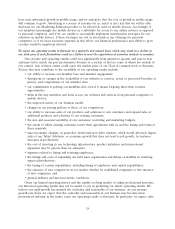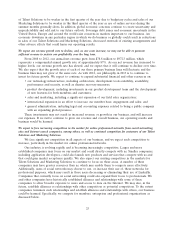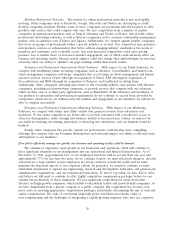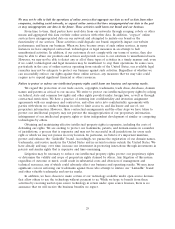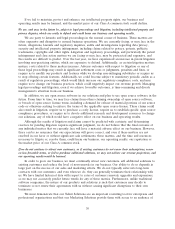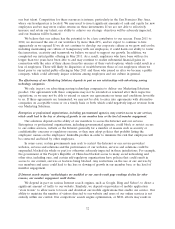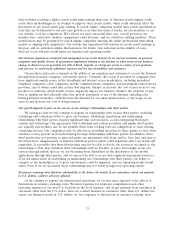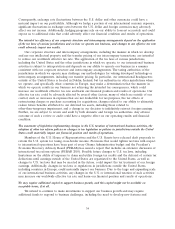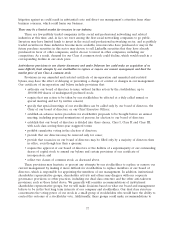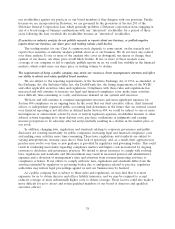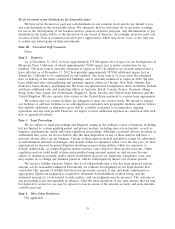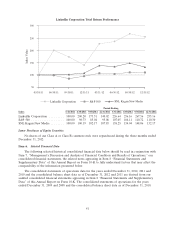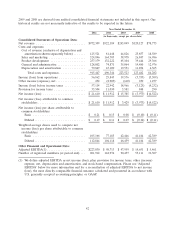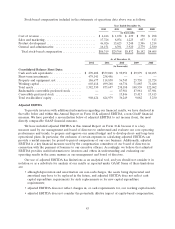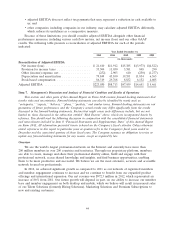LinkedIn 2012 Annual Report Download - page 36
Download and view the complete annual report
Please find page 36 of the 2012 LinkedIn annual report below. You can navigate through the pages in the report by either clicking on the pages listed below, or by using the keyword search tool below to find specific information within the annual report.Consequently, exchange rate fluctuations between the U.S. dollar and other currencies could have a
material impact on our profitability. Although we hedge a portion of our international currency exposure,
significant fluctuations in exchange rates between the U.S. dollar and foreign currencies may adversely
affect our net income. Additionally, hedging programs rely on our ability to forecast accurately and could
expose us to additional risks that could adversely affect our financial condition and results of operations.
The intended tax efficiency of our corporate structure and intercompany arrangements depend on the application
of the tax laws of various jurisdictions and on how we operate our business, and changes to our effective tax rate
could adversely impact our results.
Our corporate structure and intercompany arrangements, including the manner in which we develop
and use our intellectual property and the transfer pricing of our intercompany transactions, are intended
to reduce our worldwide effective tax rate. The application of the tax laws of various jurisdictions,
including the United States and the other jurisdictions in which we operate, to our international business
activities is subject to interpretation and depends on our ability to operate our business in a manner
consistent with our corporate structure and intercompany arrangements. The taxing authorities of the
jurisdictions in which we operate may challenge our methodologies for valuing developed technology or
intercompany arrangements, including our transfer pricing. In particular, our international headquarters
outside of the United States is located in Dublin, Ireland, but tax authorities in other jurisdictions where
we operate, and specifically other countries in Europe, may make a determination that the manner in
which we operate results in our business not achieving the intended tax consequences, which could
increase our worldwide effective tax rate and harm our financial position and results of operations. Our
effective tax rate could be adversely affected by several other factors, many of which are outside of our
control, such as: increases in expenses that are not deductible for tax purposes, the tax effects of
restructuring charges or purchase accounting for acquisitions, changes related to our ability to ultimately
realize future benefits attributed to our deferred tax assets, including those related to
other-than-temporary impairment, and a change in our decision to indefinitely reinvest foreign earnings.
Further, we are subject to review and audit by both domestic and foreign tax authorities. Any adverse
outcome of such a review or audit could have a negative effect on our operating results and financial
condition.
The enactment of legislation implementing changes in the U.S. taxation of international business activities, the
adoption of other tax reform policies or changes in tax legislation or policies in jurisdictions outside the United
States could materially impact our financial position and results of operations.
Members of the U.S. House of Representatives and the U.S. Senate have released draft proposals to
reform the U.S. system for taxing cross-border income. Provisions that would tighten tax laws with respect
to international operations have been part of every Obama Administration budget and the President’s
Economic Recovery Advisory Board (PERAB) has issued a report that includes an extensive discussion of
international tax reform options (PERAB 2010). Possible future changes to U.S. tax laws, including
limitations on the ability of taxpayers to claim and utilize foreign tax credits and the deferral of certain tax
deductions until earnings outside of the United States are repatriated to the United States, as well as
changes to U.S. tax laws that may be enacted in the future, could impact the tax treatment of our foreign
earnings. Additionally, changes in tax laws or regulations in jurisdictions outside the United States,
including countries in Europe, could materially impact our business. Due to the large and expanding scale
of our international business activities, any changes in the U.S. or international taxation of such activities
may increase our worldwide effective tax rate and harm our financial position and results of operations.
We may require additional capital to support business growth, and this capital might not be available on
acceptable terms, if at all.
We intend to continue to make investments to support our business growth and may require
additional funds to respond to business challenges, including the need to develop new features and
34


